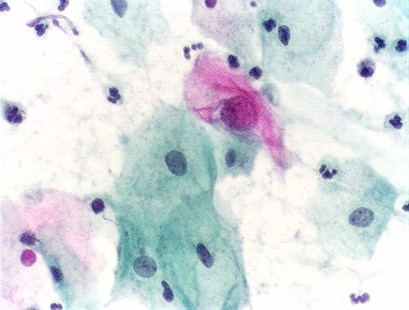
Pap smear showing abnormal cells.
Image Credit: Wikipedia
December 03, 2014 - 8:28 AM
TORONTO - New guidance from the World Health Organization is urging countries to do more to prevent cervical cancer, pushing for increased use of HPV vaccine and organized screening programs.
The report says two doses of the vaccine to protect against cancer-causing human papillomavirus infections are as effective as the three-dose schedule originally recommended.
And it suggests tests that screen for HPV infection could be adopted as a way to reduce the frequency with which women need to be screened for cervical cancer.
The recommendations are contained in updated cervical cancer prevention and treatment guidance from the WHO.
The report was presented Wednesday — local time — at the World Cancer Leaders' Summit in Melbourne, Australia.
Some of the research supporting the idea that a two-dose HPV vaccination program will suffice comes from Quebec, where last year the province scaled back the number of shots it gives girls after studies showed three were not needed.
On the issue of screening, the report says countries should screen, and can choose an approach tailored to their laboratory capacity and ability to pay. It suggests HPV screening, cytology (also known as Pap smears) or a technique called VIA or visual inspection with acetic acid.
Interest is focusing increasingly on HPV testing because of its enhanced ability to detect the infections that are the precursor to cervical cancer. The test misses fewer precancerous lesions than Pap smears.
When Canadian guidance on cervical cancer screening was last updated the group responsible for issuing it — the Canadian Task Force on Preventive Health Care — was subjected to some criticism because it did not endorse wholesale shifting to HPV testing from the less-expensive Pap smears.
The director of the WHO's department for reproductive health and research says the test is the best in terms of accuracy but is still too costly to be urged upon all countries. "You can recommend HPV testing, but you cannot demand from governments in developing countries that this is now their priority to invest in," says Dr. Marleen Temmerman, an obstetrician-gynecologist from Belgium.
"It's still a quite expensive test."
Cervical cancer screening has turned the disease — still a major killer in the developing world — into a rarity in countries like Canada that stress the importance of regular screening. Canada was a pioneer in cervical cancer screening, starting in 1949.
A study published two years ago showed that in the decades since Canadian women started getting regular Pap smears, new cases of invasive cervical cancer and deaths to the disease have plummeted. It noted that cervical cancer deaths fell to 2.2 per 100,000 women each year from a peak of 13.5 per 100,000, an 83 per cent drop.
The Canadian Cancer Society estimates that this year 1,450 women in this country will receive a diagnosis of cervical cancer and 380 will die from this form of the disease.
In recent years, what was once an annual test has become something women are urged to do every three years after the age of 25. That was the recommendation when the Canadian Task Force on Preventive Health Care last issued guidance on cervical cancer, in January 2013.
But breaking women and their doctors of the habit of scheduling annual Pap smears hasn't been easy, admits Dr. James Dickinson, the University of Calgary medical professor who chaired the committee that drew up the evidence-based recommendations.
"There are an awful lot of women in Canada getting annual Pap smears," he says.
Moving to HPV testing could eventually provide savings for a country like Canada. Because the test is so accurate and this form of cancer is generally slow growing, the length of time between tests could be stretched out considerably. Some models suggest women could potentially be tested just twice in a lifetime, around age 30 and then again later in life.
It's unlikely that approach would be adopted in Canada any time soon. When the country moves to HPV testing, the recommended interval might be something like every five years, with screening potentially stopping at age 59 or 69, suggests Dr. Gina Ogilvie of the British Columbia Centre for Disease Control.
Ogilvie is co-principal investigator of a study comparing HPV screening to cytology. The trial, which involves about 25,000 women in B.C., is expected to be completed late next year.
Ogilvie says early results look promising. But questions remain about how to best adapt established screening programs like those in Canada to include HPV screening, including at what age screening should start and when is it safe to tell women they no longer need to be screened for cervical cancer.
Another consideration relates to the difficulties of getting people to have a test at irregular intervals. Remembering to do something once a year — get a flu shot, for instance — isn't so hard. Remembering where you are in a four- or five- or 10-year cycle is more challenging.
Temmerman says her recommendation would be to use significant birthdays as a gauge, in the way that people are urged to undergo colon cancer screening at age 50. She suggests girls could be vaccinated against HPV at age 10 and women could be told to book their first cervical cancer screening appointment at age 30.
News from © The Canadian Press, 2014